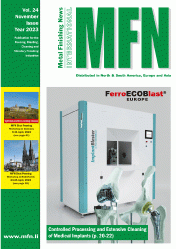E-Archive
Interview
in Vol. 24 - November Issue - Year 2023
Will Shot Peening Be the Technical Solution Even In the Digital and 3D ERA?
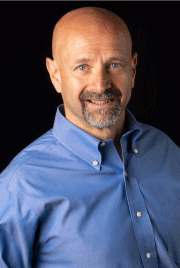
Michele Bandini, General Manager of Peen Service
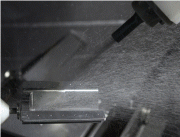
Shot peening
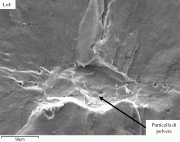
Lack of fusion defect
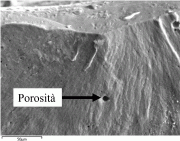
Porosity defect
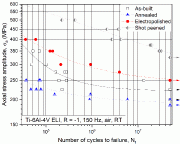
Fatigue curve
MFN met Michele Bandini, the General Manager of Peen Service and his team, during the 14th International Conference on Shot Peening in Milan. Michele is also an MFN trainer and we were glad for the opportunity to interview him.
(?) MFN: Hi Michele, it's nice to meet you from time to time. Tell us why are you here?
(!) M. B.: It’s a pleasure for me. I'm here as part of the organization of the conference together with the Politecnico di Milano. I have already attended this type of conference but doing it as an organizer is very different from any other modality, you start organizing the event more than two years before and you deal with aspects unknown until then. It was a good challenge and for me a real privilege and an honour.
(?) MFN: Which other conferences have you attended in the past?
(!) M. B.: Staying on the ICSP topic, the first one I attended was ICSP6 in 1996 in San Francisco. I had been with the company for a few years and was involved in research at the time and this conference was the perfect opportunity for a full-immersion in shot peening research. I was able to engage with the best universities around the world in this regard. On that occasion I participated as a listener, to improve, and to enter into the topic at full speed.
(?) MFN: At its very beginning Peen Service was a very small entity. Were you already so attentive to scientific research?
(!) M. B.: Actually, yes. It's true, we were very young and very few. We were born as a shot peening department of Norblast, a manufacturer of shot blasting and shot peening plants. We are now a shot peening company that continues to do research but at the same time also works on behalf of third parties, and Norblast is our holding company. Research has always been our “leit motif”. We were convinced that only through a deep understanding of the process could we really help companies solve their problems. This was our idea, not only to perform the shot peening correctly, but to understand it in a very profound way, in all its possible applications, even and above all in those unknown till that moment. It was during the San Francisco conference that I realized I was on the right track. The conference was very crowded. The interest of the universities and companies participating the conference was very evident, I could practically breathe it. Since then, we have started collaborations with various universities, financed degree theses and research doctorates. We have never stopped doing research and today Peen Service has become an Italian excellence in the field of research and applications of Shot Peening.
(?) MFN: After all this time do you think the process is still unknown and more research needs to be done?
(!) M. B.: Obviously, what we have learned in over thirty years is a wealth of scientific knowledge of great value. In some areas we have really investigated a lot, but knowledge is a dynamic thing. It is the context that defines its value, its limits and whether or not it needs to be increased.
(?) MFN: Can you further explain it?
(!) M. B.: Sure. Let's first keep in mind that although it might seem a mature treatment, shot peening was discovered around the 1930s. We are just under a hundred years after his birth. It may seem like a lot but in mechanics it's not. If we think of heat treatments it is easy to understand. Since ancient times it was discovered that heating and cooling metal increased its mechanical properties and in the Middle Ages significant progress was made in this direction, just think of the famous "blades of Toledo" which marked the history of certain decisive battles. Despite the very far origins, the need for knowledge never stops. And the reason is what we have just said, it is the context that defines the values in the field. When the context changes or is different, the values change accordingly.
(?) MFN: Interesting and fascinating, there is something almost epic in what you are saying. Could you give us some examples of the relationship between context and value?
(!) M. B.: If we look at the typical context of application of shot peening, it is easy to understand that aerospace is the one that collects the best examples. In theory we can say that everything that flies in the sky uses the shot peening process. The aim is to increase the resistance to mechanical fatigue. In this way, aircrafts are lighter, consume less fuel, have a longer life and are more reliable. All in the interests of sustainability. This type of context moves with great caution. All the technologies used must be extremely robust and validated by extremely rigorous qualification procedures. Unfortunately, accidents in the aeronautical field often produce catastrophic results. For this reason, the context, albeit cutting-edge, must move with great caution and therefore at low speed. In this area, research also moves with great precision and at an equally low speed.
On the other hand, let's think of a different context, say Additive Manufacturing, that’s considered the technology of the moment. After the initial enthusiasm and the “trough of disillusionment” typical of all novelties, as reported by the Hype Cycle, the market is now in full industrial application. Initially, the engineers understood where and how to apply it and, later, that in order to obtain greater benefits it would have been better to start from the design. Specifically, the design of the Additive components with systemic thinking. At this point, always in a systemic way, we enter the field, with our propensity for scientific research on post-process surface treatments, for the improvement of aesthetic, functional and fatigue performance. The speed at which this context moves is very high and therefore research must move accordingly at an equally high speed.
(?) MFN: All clear. So are you also exploring the Additive world?
(!) M. B.: Of course, and from the first results we can say that the improvements obtained with shot peening are still higher than those seen so far in traditional mechanics. Once again, it is necessary to investigate in depth because these materials have different characteristics from the traditional ones and this depends on many parameters, some of which are linked to the specific type of additive technology used.
(?) MFN: Really very interesting. Could you give us some examples to help us understand better?
(!) M. B.: Let us first think of conventional metallurgy. The processes have become extremely accurate, and it is possible to obtain “super clean" materials, practically free from defects of any kind. The performances are very high, and therefore the shot peening treatments are aimed at improving the performance and fatigue resistance of the materials rather than at correcting their defects.
Let's think now of additive manufacturing. The processes have improved a lot over the years but to date the technology still produces small defects that need to be taken into account, at least in terms of fatigue performance. We should also bear in mind that the surface roughness of additive products, although better than in the past, is still very high compared to mechanical machining, another aspect that reduces fatigue performance. It is clear that research and work on this front will help to solve the typical problems of this technology and to expand its diffusion.
This is our mission, to help our customers improve their products.
(?) MFN: Thanks Michele for this very interesting talk. When is the next ICSP conference?
(!) M. B.: The next one will be the ICSP15, which will be held in 2025 in the United States, at the University of Purdue, in the state of Indiana. In the meantime, research and studies continue!
(?) MFN: Thanks again Michele, see you soon and good luck with your work!
(!) M. B.: Thank you, same to you!
MFN would like to thank Michele Bandini for this interview!
For Information:
Peen Service Srl
Via Augusto Pollastri 7
40138 Bologna, Italy
Tel. +39.051.533 550
Fax +39.051.531 307
E-mail: info@peenservice.it



